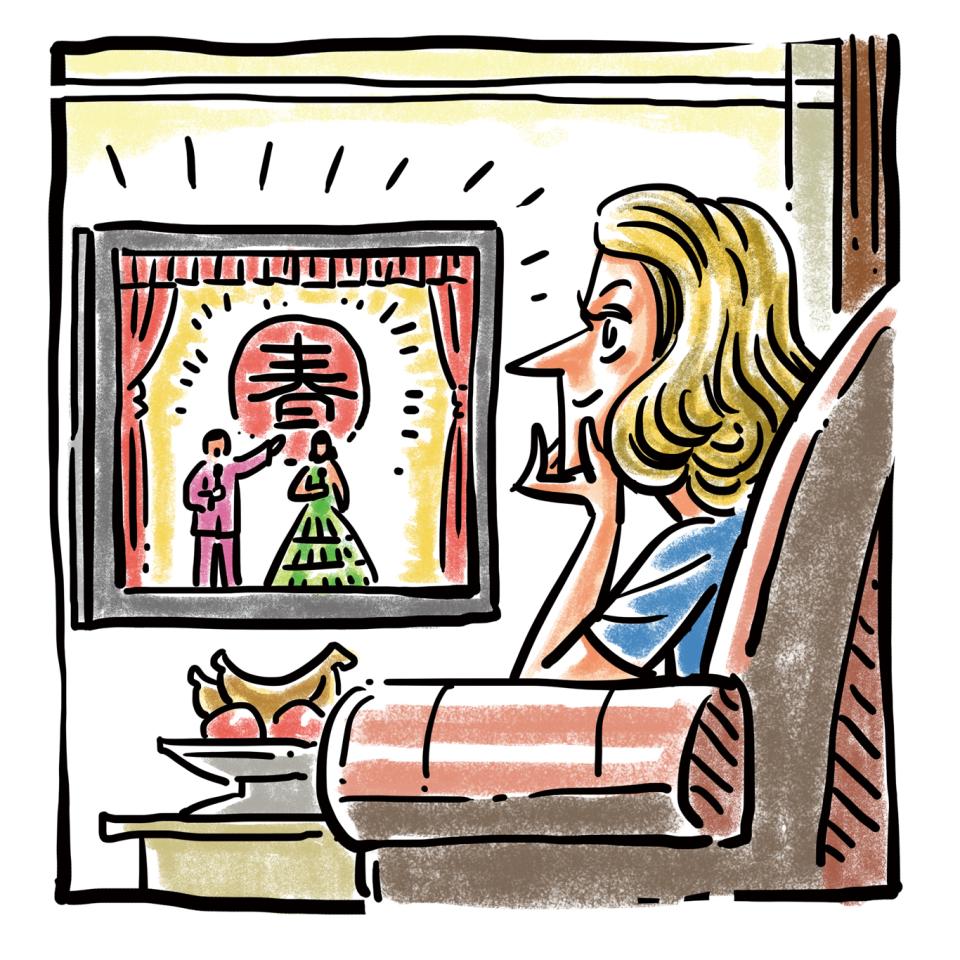My favorite part about winter in Beijing is that shortly after Christmas and New Year, you get another holiday – seven days off for Spring Festival, or Chinese New Year. Actually, my favorite part is that I don’t have to celebrate it with anyone. While you stand to get lots of great food and drink, you might be forced to watch the annual Spring Festival Gala, known as the Chunwan, broadcast by State network China Central Television. On all of its channels, and on all the other channels. It goes on for what seems like days, and is not a background kind of thing. The people that love it the most are the older generations, and hard of hearing, they need it at full volume.
It’s a kind of variety show, with singers, dancers, comedians, magicians, skits… the style is loud and colorful – sometimes too colorful, when sketches that are intended to promote inclusivity with foreigners fall into stereotypes and comedy so broad you see it coming before the sketch has even started. I think most people might not even notice if they showed an edition from a previous year, so used are they to the mix of rousing songs and New Year bonhomie. I watched it once to see what it was all about, and just like that time I went white water rafting on the Zambezi River at Victoria Falls and nearly drowned, I decided I didn’t need to experience it again.
But the very best thing about the Chunwan is that one of my friends has to endure the whole thing, from beginning to tumultuous end, at the home of his mother-in-law. It’s like asking your elderly relatives in the UK to miss the Queen’s Speech on Christmas Day, although mercifully that’s only around 10 minutes. Most people have annual traditions at holidays. Mine is to send supportive (he might say mocking) messages on New Year’s Eve to my friend, asking about the status of the Chunwan at regular intervals. Is it time for the military choir? The dancing Tibetans or the bumbling comic? Even worse, the adorable angelic child singer with the scary grown-up make-up.
At the end of the Chunwan, there are the fireworks to look forward to. Actually, not in downtown Beijing anymore – after years of being banned, they were allowed in the city center again, only to be prohibited again a couple of years ago. I’m quite glad – I once saw a man allowing his child to launch fireworks from their apartment window and it was quite a stressful experience. So now New Year’s Eve is relatively quiet and peaceful.
Perhaps the strangest thing about this long holiday is the make-up work days. The government giveth, in the form of seven consecutive days off, and the government taketh away, in the form of forcing you to work on the weekends prior to or after the holiday – sometimes both. Since Chinese holidays are mostly decided by the ancient lunar calendar, they don’t fall on fixed dates – rather like Easter, they are a moveable feast.
The first time I encountered this was early in my China career, when I was studying Chinese at a Beijing university, where most of the students were a good 10 years younger than me. The government had just decided to give two weeklong vacations – one in May, and one in October, intended to stimulate the economy. The first one, dubbed a “Golden Week,” was in May. People were encouraged to go out, sightsee, travel and consume. The problem was that they all went to the same place on the same day. The students I taught said that on the first day of the holiday, they did as they were told, only to arrive somewhere like the Summer Palace in Beijing and not be able to move an inch. So they went home and didn’t dare venture out for the rest of the week.
So when the second week arrived, the following October, we were wise to it, or so we thought. Our teacher announced that in fact, we were not really being given seven days off class, but rather three. Plus two weekends. But because the holiday, from October 1-7, didn’t fall neatly between two weekends, we would be given the Thursday and Friday off. But then the previous Saturday became Thursday again, and the Sunday was designated as another Friday. Depressing, to have to work two Fridays in the same week. My younger classmates were distraught. “Why?” they chorused, seeing the fleeting prospect of nine whole days holiday ripped away from them. The teacher was made of stern stuff. She fixed them with a beady eye and replied: “There is no why.”
I’ve always remembered these as words to live by in China, when confronted by a vexing situation, like looking forward to a public holiday, only to have to work for eight days in a row and be so exhausted you just sleep through the whole thing. But, I comfort myself, at least I will be doing it in relative silence.

 Old Version
Old Version